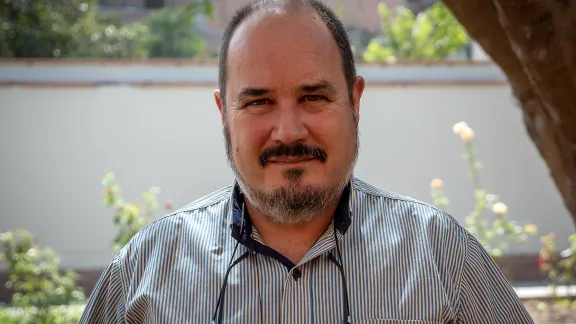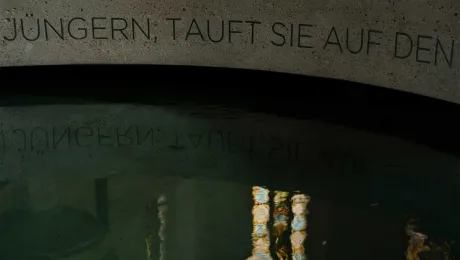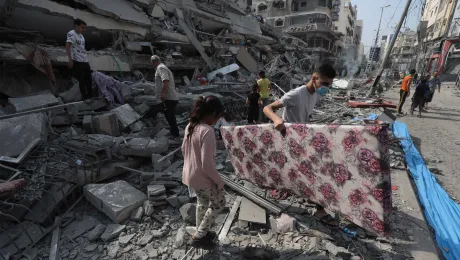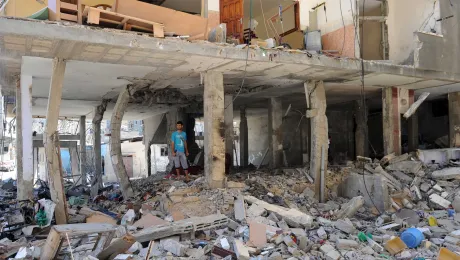
Rev. Leonardo Schindler, Pastor President of the Evangelical Church of the River Plate. Photo: LWF/A. Danielsson
Voices from the Communion: President Leonardo Schindler of the Evangelical Church of the River Plate
(LWI) - One year ago, Rev. Leonardo Schindler took up the position as pastor president of the Evangelical Church of the River Plate (IERP), serving communities scattered across Argentina, Paraguay and Uruguay. The roots of these communities go back to the mid-19th century, with the arrival of German and Swiss immigrants in the region.
In this Voices from the Communion interview, he talks about the challenges facing his church today and the important contribution it can make to the construction of a more democratic society in Latin America.
Tell us about your childhood in Argentina and your vocation to the ordained ministry?
I come from a traditional church family and from my earliest years I participated in the catechesis for children, before going on to my confirmation classes. After that though, I left the church, promising myself that I would never return. Not long afterwards, a pastor asked me to join a youth group that was doing social work in a neighborhood of Buenos Aires. So, I returned, not with much enthusiasm, but I went back to the church.
In that neighborhood, I had an experience of coming to know Christ in the presence of the boys I was serving. Working there in a refectory, I was able to understand everything that, for years, I had learnt in my catechesis and confirmation classes. I can say that it was there that I made the decision to become a pastor so that many more people would also be able to know Christ through his teachings, his commitment to the lives of human beings and to creation.
What can you tell us about your church which is present in three countries?
Yes, the Evangelical Church of the River Plate is relevant because of the diversity of the different societies in Paraguay, Uruguay and Argentina, even though they are in the same region of the Southern Cone. It is a church that began simply by accompanying German and Swiss migrants arriving in the region, but nowadays has taken on the challenge of being a truly missionary church, a church that proclaims the word of God.
We are in the process of becoming a church that is offering more and more in terms of greater social commitment, a church that can contribute through its distinctly Protestant character. I believe that we, as Protestants, have much to contribute to the construction of a more democratic society, because we believe in the universal priesthood of all believers and our exercise of power is completely horizontal. Our churches were born, not in the hegemonic discourse of dominance and control, but through a process of critical thought and the knowledge that the more people can understand, the freer they will be.
I believe that we, as Protestants, have much to contribute to the construction of a more democratic society because we believe in the universal priesthood of all believers and our exercise of power is completely horizontal.
I believe our Protestant churches, our Evangelical Church of the River Plate but also the other churches of the Lutheran World Federation, have an important contribution to make to the construction of Latin American society because we bring a message of grace. Today we live in a society where many people are searching for something to free them from the enormous pressure they feel every day. So many people feel they have to justify to themselves and to others their value as a person, and they believe the more things they achieve, the more value they will have. They are immersed and absorbed in a race that is destroying them and the whole of society.
The message of grace is a liberating message, because it says, "The value of the person is not founded, nor justified by merit or by conquests, but in the value of the human person. I believe that we have to bring this truth to a society that is also more and more fanatical and fragmented, precisely because of fanaticism and fundamentalism. Not only religious fundamentalism, but also political fundamentalism, which only generates divisions. I think that, as Protestants, we have a lot to contribute there.
In these three countries, what would you see as the greatest challenges facing the churches?
The main challenge is to be a church that is everyone's home. A church that, as Pastor Silvia Genz, President of the Evangelical Church of the Lutheran Confession in Brazil (IECLB), has said: "Where people do not throw stones at each other, but where we can build a house that is for everyone.” A place that does not give rise to fanaticism or fundamentalism. Communities that are open, receptive, inclusive, loving, precisely as a response to the love, inclusion and mercy that God has for all of us.
What is it in your church that inspires you most?
We have many activities and a strong commitment to justice, to supporting communities in need, where people come together to celebrate life as well. I believe that an enormous challenge facing us today is to be churches that, in one way or another, through encounter, but also through solidarity, help to generate more humane living conditions.
I am also inspired by our message and our commitment to public advocacy. We have to be churches that can articulate this commitment with the state, with governments to create more just societies. That is what motivates me, even though there are church members who are enthusiastic about this idea and others who are not, but I believe we can invite them all to join us.
I also think it's very motivating to feel part of a body that is bigger than just our own church. The opportunity I had, in 2019, to participate in my first leadership conference was very important precisely because one feels part of a larger body, at the continental level or even at a global level. You can feel that others are united with you in prayer, but also in their practical commitments to share resources as part of a larger body. It’s inspiring but also very challenging.
What do you hope to achieve over the next years?
I would like to have become a good church president, a good pastor for the pastors in my church. I would like to see a church that feels part of the fabric of society in which it finds itself, a church committed to the kingdom of God and his justice here in this world. I’d like us to be able to grow in unity within the churches. And at a personal level, of course, I'd like to continue to find time for my family and watch my grandchildren grow up.
The Lutheran World Federation is a global body that shares the work and love of Christ in the world. In this series, we profile church leaders and staff as they discuss topical issues and set out ideas for building peace and justice in the world, ensuring the churches and communion grow in witness and strength.


